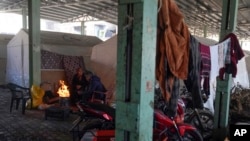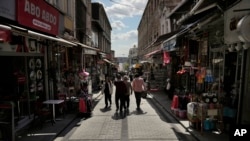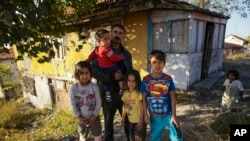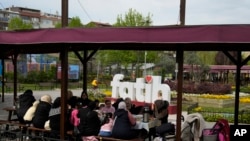Amid Turkish President Recep Tayyip Erdogan’s efforts to normalize relations with Damascus and his rival Kemal Kilicdaroglu’s vow to return Syrian refugees to their war-torn country, Syrians in Turkey are watching Turkey’s presidential election runoff closely.
In the first round of the presidential election, Erdogan got 49.52% of the votes, while Kilicdaroglu received 44.88%. Because neither candidate passed the 50% threshold, they will meet in the runoff May 28.
Ali Al Mohammad, 33, who left Damascus in 2014 and has held Turkish citizenship since 2018, said he was not happy with the election results, but he was relieved, as he feared a possible opposition win. Mohammad and other Syrians spoke to VOA using pseudonyms, fearing possible retribution.
“We [Syrians in Turkey] are all living in constant fear, like, ‘What is going to happen? Who is going to win? And if the opposition is going to win, what will happen to us? Will we be deported?' ” Mohammad told VOA.
Largest refugee population
According to the U.N. refugee organization, Turkey hosts the world’s largest refugee population, with “almost 3.6 million Syrians under temporary protection and close to 370,000 refugees and asylum-seekers of other nationalities.”
During his election campaign, Kilicdaroglu, the candidate of Nation Alliance, made up of six opposition parties including his Republican People’s Party, has vowed to voluntarily repatriate the Syrian refugees in Turkey within two years if elected. He has also voiced his intent to renegotiate a 2016 migration deal between Turkey and the European Union in which Brussels agreed to provide 6 billion euros to Ankara to prevent refugee crossings onto EU soil.
On the other hand, Erdogan, the head of the ruling Justice and Development Party (AKP), has pledged not to expel Syrian refugees and emphasized that Ankara has built tens of thousands of housing units in northwestern Syria to enable their voluntary return.
“Now, we have built over 100,000 houses for them in northern Syria, and because of this, the refugees we have now have gradually started moving to those houses,” Erdogan said in a televised meeting with young voters on May 11.
Turkish Interior Minister Suleyman Soylu announced Tuesday that 553,335 Syrians had returned to “safe areas,” referring to the region held by the Turkey-backed opposition in Syria.
Mohammad called Erdogan “the bittersweet option,” and he argued that the opposition parties were “getting their votes by fueling the rage of the people against the Syrians.” Mohammad noted that at least AKP was promising not to force Syrians back to their war-torn country.
“How is this willingly going to be done? I do not know. But at least we are not going to be forcibly deported back to Syria,” Mohammad said.
Deportations
Kholud Sahin, 30, a Syrian residing in Turkey’s southern Gaziantep province with Turkish citizenship, is a pro-Kurdish Green Left Party (YSP) voter in the parliamentary election.
Despite the YSP’s support for Kilicdaroglu, Sahin said she was against him because of his anti-Syrian rhetoric and did not want Erdogan to win either.
“Erdogan also says, ‘We built villages, and we will send them back.’ There are already deportations happening now. For two or three years, there has been a spike in deportations that are not in line with human rights,” Sahin told VOA, adding that she has heard torture allegations from people deported back to Syria by the Turkish authorities.
“In violation of international law Turkish authorities have rounded up hundreds of Syrian refugees, even unaccompanied children, and forced them back to northern Syria,” said Nadia Hardman, refugee and migrant rights researcher at Human Rights Watch, in a statement released in October 2022. Turkish authorities deny these allegations.
Last month, HRW alleged that “Turkish border guards are indiscriminately shooting at Syrian civilians on the border with Syria, as well as torturing and using excessive force against asylum-seekers and migrants trying to cross into Turkey.”
Normalization with Syria
Turkish and Syrian authorities launched reconciliation talks as Russian, Turkish and Syrian defense ministers and intelligence chiefs met in Moscow last December.
On May 10, Ankara and Damascus announced they had agreed to set up a road map to restore ties between Turkey and Syria after the talks between Turkish, Syrian, Russian and Iranian foreign ministers in Moscow.
In a statement from the Russian Foreign Ministry, the ministers called for more international aid to Syria “in the interests of voluntary, safe and dignified” refugee returns and postwar reconstruction.
Erdogan also hinted that he would meet with Bashar al-Assad, but Assad conditioned such a meeting on Turkey withdrawing its military from northern Syria.
Syrian refugee Mustafa Ali, 37, said he thought the election result was good for Syrians but noted that some people do not trust Erdogan because of possible normalization with Assad.
“There is a huge part of Syrian refugees in Turkey who are saying Erdogan has disappointed them. He says, ‘We will protect you; we will send you to Syria without Assad.’ And now, he is going to shake hands with Assad,” Mustafa Ali told VOA.
“He is the one who said, ‘Assad is a criminal.’ How is he going to shake his hand? That’s why they do not trust him,” Mustafa Ali added.







